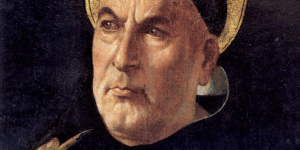While students sleep in, instructors and school administrators reflect on the spiritual side of their teaching ministry.
By Brother John Steilberg, O.P.
During the course of the school year, the faculty and staff at Fenwick participate in Dominican Formation Days. These late-start dates for students are an opportunity for the faculty and staff to reflect on who we are as a Catholic and Dominican school. Dominican formation stems from our need for ongoing education and formation in Catholic values vital to the mission of our school. We would like to share some thoughts shared by our faculty and staff after attending our most recent Dominican formation day in February.

One faculty member commented, “Dominican formation helps us better understand the Dominican tradition central to our school identity and helps us strengthen community with one another.” Another faculty relayed these sentiments: “It is important for us to participate in Dominican formation so that we can continue to grow spiritually as a community and to continue to remind us of our mission.” Another stressed the need to extend our mission to how we live, teach and preach here at Fenwick every day. “I would see the purpose as continuing to reflect on how we can best understand and live out our Catholic Dominican identity in specific ways.”
Dominican formation centers on the Four Pillars of Dominican Life:
- Prayer
- Study
- Community
- Preaching
The Four Pillars are a descriptive way of explaining the essence of and daily practice of Dominican life. The Dominican friars here at Fenwick live out the pillars in a very intentional way and oftentimes in a very external way. But all of our faculty and staff, in a wide diversity of actions, live out the pillars as part of their particular Christian vocation.
“Our job at Fenwick is to do more than teach and support academically, but to show through our actions the meaning of Christ’s love.”
One teacher described this shared mission of both the Dominican friars and the staff in this way, “As teachers, we must be able to model the Dominican Catholic values of the school.” Another teacher asserted, “Also, to remind us that our job at Fenwick is to do more than teach and support academically, but to show through our actions the meaning of Christ’s love.”
The Fenwick Community

Each year, our Dominican formation programs focus on one of the four pillars in particular. This year we reflected on “community,” how we are called by God to live together as Christian people. As a community, we discussed questions such as:
- What is the most important thing we do that brings us together as a community?
- What issues divide us at times?
- What items do we need to work on?
We also examined where are the margins of our community are and how we can bring the gospel message to those margins. Our conversation was heartfelt and lively around these difficult questions.
What Makes Fenwick Different?
In later meetings we discussed our identity as a Catholic school. What makes us different, being Catholic and Dominican, from other schools in the area? One teacher explained it this way: “Every school prepares its students to lead, achieve and serve. Not every school’s mission is predicated upon a deep theological commitment to the dignity of the human person.” One faculty member explained, “to be Catholic is to be counter-cultural. Our identity and our values need to be true to who we are — even though that may not be popular or generally accepted.”
“Not every school’s mission is predicated upon a deep theological commitment to the dignity of the human person.”

We then discussed how to avoid going too far in emphasizing what makes us different, so that we can preach Jesus’ universal message of the gospel that is meant for all of mankind. This can be a challenging balance: to be true to our Catholic identity yet open to diversity, welcoming to all people, and proclaiming God’s mercy available to every person.
Finally, we discussed where God is in this picture here at Fenwick. Faculty members expressed this idea: “God is [present] in relationships with other people, with our students and our colleagues.”
As we strive to build a faith community, what does that say about what we believe about God? What is God asking of us, as a faith community, as a high school? These are challenging questions. These are questions that may take a lifetime to answer. But that is what we are about here at Fenwick. We seek the Truth.
Continue reading “Dominican Formation Among Fenwick’s Faculty and Staff”
















